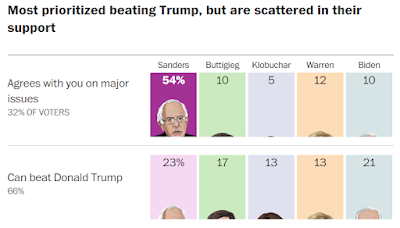On Saturday in Nevada, Bernie Sanders laid waste not just to his five main rivals but also to every shard of conventional wisdom about the Democratic presidential primaries....Many Democratic voters don't see Sanders as electable -- they may be right -- but in Nevada, as The Washington Post noted, they were predictably divided, according to entrance polls:
Sanders wasn’t supposed to be able to break through with black and brown voters.... (Sanders won 27% of African Americans and 53% of Hispanics across the state.) The Sanders movement is supposed to be limited to those crazy college kids who don’t remember socialist as a slur.... (Sanders won every age category in the state except Nevadans over 65, which he ceded to Joe Biden.)
... He was said to have a ceiling of 30% or so. Remarkably, against a much larger field of candidates Sanders is poised to come close to the same level of support as he did in 2016 in a one-on-one race against Hillary Clinton, to whom he lost 47%-53%. (He was at 46% with a quarter of precincts reporting as of this writing.) He was said to be unable to attract anyone outside his core base. But he held his own with moderate voters (22%) and won across every issue area except voters who cared most about foreign policy, who went with Biden.
It looks as if Sanders is unstoppable, but if he can be stopped, it will be by one candidate, not three or four splitting the anti-Sanders vote. Maybe Amy Klobuchar (who's at 4.5% right now) will have the good sense to drop out. Pete Buttigieg probably won't -- he was at 15.4%, in third place -- but while he seems to have enough support to be a strong runner-up in several states, he doesn't have enough support to, y'know, win.
By a nearly 2 to 1 margin, early entrance polling found more Nevada caucus-goers said they would prefer a candidate who can beat Trump over someone who agrees with them on major issues. But electability-focused voters were deeply divided in their initial support heading into caucus locations, with just under one-quarter supporting Sanders and Biden; about 1 in 6 caucus-goers supporting former South Bend, Ind., mayor Pete Buttigieg; and Sens. Amy Klobuchar and Elizabeth Warren in the low teens of support.
That is a stark contrast to the one-third of voters who preferred a candidate that agrees with them on major issues; a small majority of this group supported Sanders, while other candidates at most barely broke double digits with this group.
And as for Joe Biden, Lizza writes:
Biden did better, though a second place finish twenty points behind Sanders isn’t much to crow about for a former vice president. Still, being on the upswing, however gradual it is, going into South Carolina is essential for Biden. If he is the first candidate to definitively defeat Sanders in a contest, it could resurrect his campaign.Well, maybe. But he's looked weak in the first three contests. He can't dominate any contest, the way Sanders dominated Nevada, unless Buttigieg and Klobuchar drop out (and maybe not even then). And after South Carolina, there'll be Mike Bloomberg.
That's why it may actually be helpful to the anti-Sanders cause if South Carolina Republicans are successful in their scheme to turn out Republican voters for Sanders in the state's open Democratic primary. Biden's remaining justification for staying in the race is that he can win some states. For months he's been expected to win South Carolina, where the Democratic electorate is largely black, though in one recent poll he was tied with Sanders.
Biden will stay in the race if he wins South Carolina, and then he and Bloomberg (and possibly Buttigieg and Klobuchar) will split the anti-Sanders vote on Super Tuesday. But if GOP ratfuckers help Sanders win South Carolina, maybe Biden will have the good sense to drop out. Maybe Buttigieg and Klobuchar will be gone as well. If that happens, it'll be Sanders vs. Bloomberg, one on one.
Otherwise, it's Sanders all the way, and you'd better get used to it.

No comments:
Post a Comment